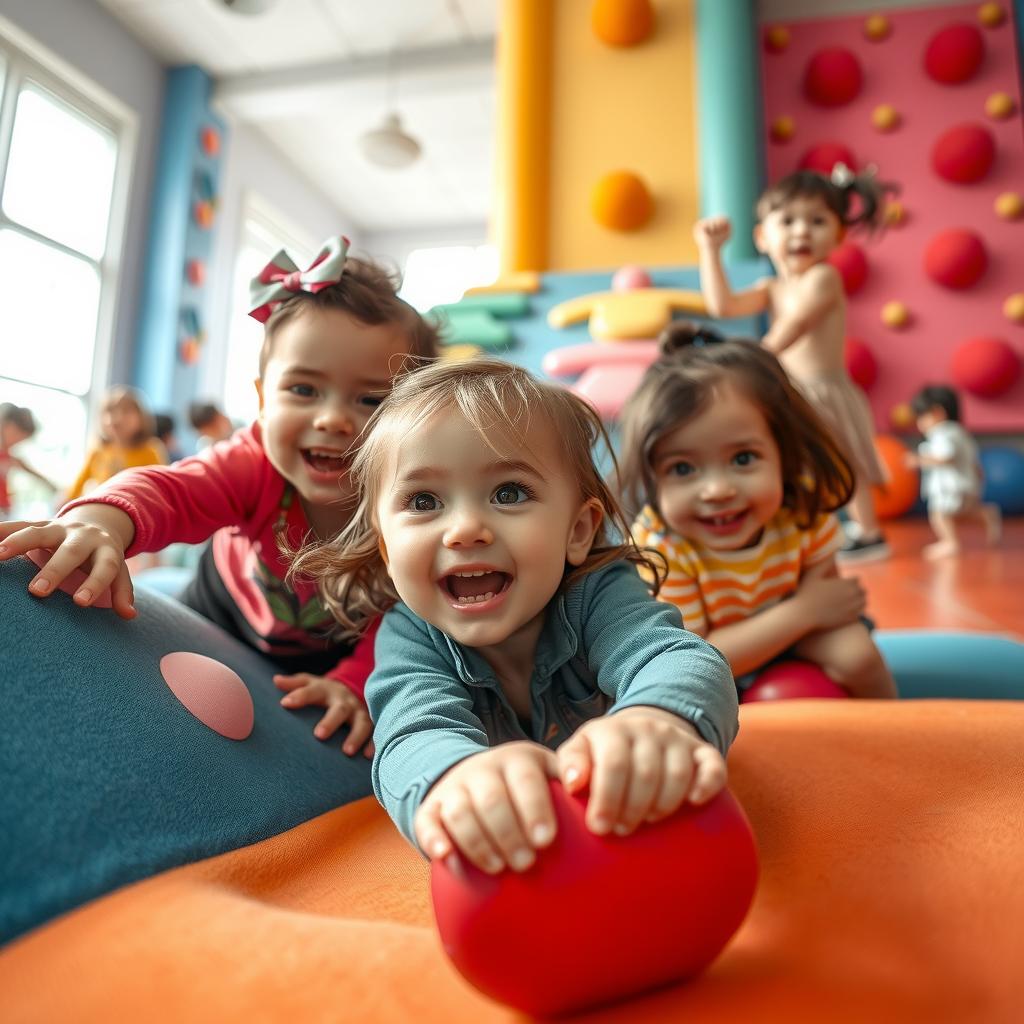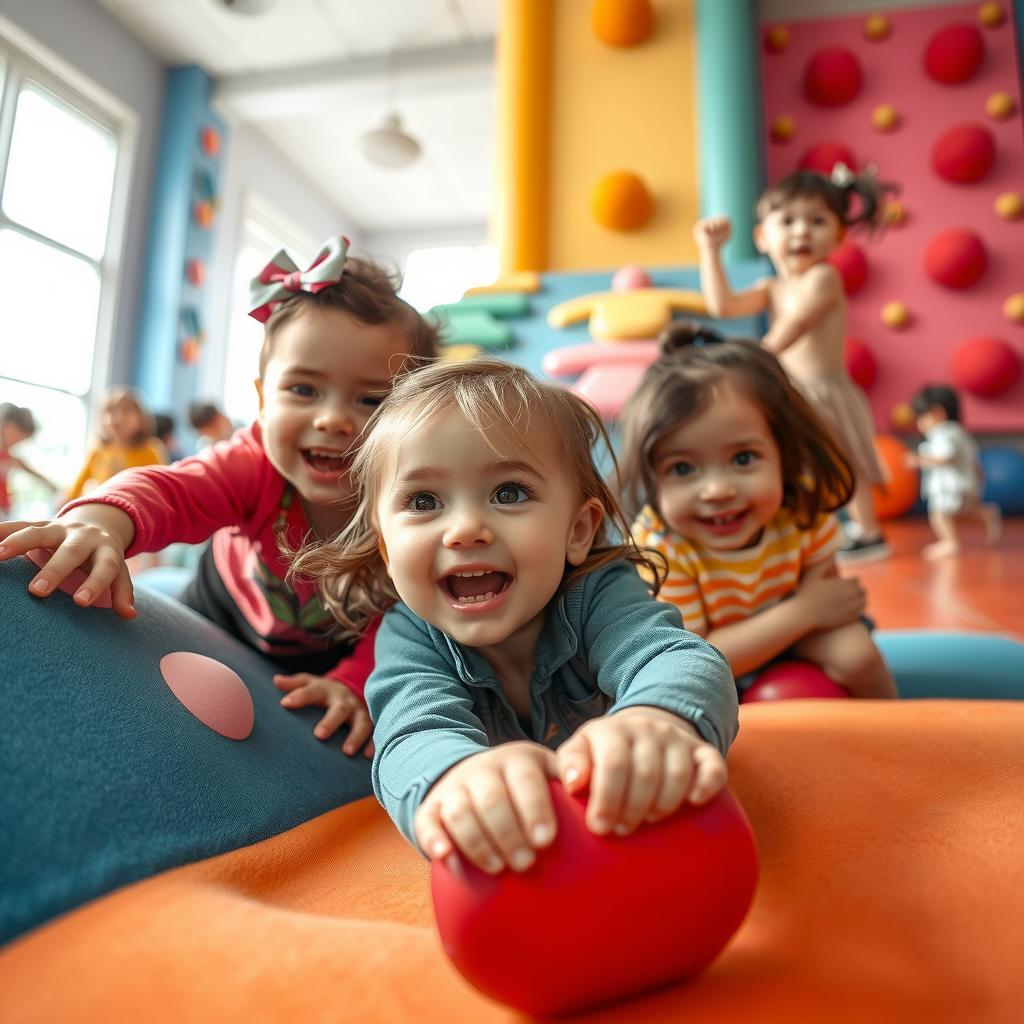In an age where children are increasingly drawn to screens and sedentary activities, the importance of fostering physical play during early years cannot be overstated. Parents and caregivers often grapple with finding engaging ways to support their little ones’ growth while encouraging healthy habits. One effective solution lies in Soft Play Climbing, an innovative approach that combines fun with developmental benefits tailored for children under three. This type of play not only captivates young minds but also serves as a critical foundation for essential skills that can shape their future.
As toddlers navigate through the colorful structures of Soft Play Climbing, they embark on a journey that promotes both physical activity and cognitive growth. The gentle challenges presented by soft climbing surfaces encourage them to enhance their motor skills, balance, and coordination—all vital components of child development during these formative years. Moreover, this playful exploration is far from one-dimensional; it offers rich sensory experiences that stimulate curiosity and engagement, making learning enjoyable rather than daunting.
Equally important are the social interactions fostered in these vibrant environments. When children engage in Soft Play Climbing together, they learn valuable lessons about sharing space, taking turns, and cooperating with peers—skills integral to emotional intelligence and community building. Such collaborative play nurtures friendships at an early age while laying the groundwork for effective communication as they grow older.
Throughout this blog post, we will delve deeper into the multifaceted advantages of incorporating Soft Play Climbing into early childhood activities. By exploring how it supports various aspects of development—from enhancing gross motor capabilities to promoting imaginative play—we aim to highlight its significance as more than just a recreational option but rather as a powerful tool for holistic child development. Join us on this exploration of how embracing active play can transform everyday moments into enriching experiences for your little ones.

Key Points:
-
Motor Skill Development: Enhancing Coordination and Strength
Engaging in Soft Play Climbing activities allows toddlers to refine their motor skills as they navigate various climbing structures. This dynamic form of play fosters coordination, balance, and strength—essential components that support overall child development. The physical activity involved not only makes the experience enjoyable but also lays a solid foundation for future athletic pursuits. -
Sensory Exploration: Stimulating Cognitive Growth
Through the unique experiences provided by Soft Play Climbing, children encounter a variety of textures and movements. These sensory opportunities are crucial for stimulating cognitive growth, encouraging toddlers to explore their environment actively. As they climb, children enhance their ability to process information through tactile engagement, which significantly contributes to their early learning journey. -
Social Interaction: Building Emotional Intelligence
The communal aspect of Soft Play Climbing promotes vital social interaction among young children. As they share climbing spaces with peers, toddlers develop essential communication skills and learn the importance of teamwork. Participating in cooperative play scenarios nurtures emotional intelligence at this formative age, helping them build relationships while navigating challenges together in a fun-filled environment.

The Role of Play in Physical Development
Understanding the Connection Between Movement and Growth
Play serves as an essential component of physical development for toddlers, fostering their motor skills through engaging activities. One effective way to enhance these skills is through Soft Play Climbing structures, which provide a safe environment for children to explore their physical capabilities. As toddlers climb, jump, and navigate various obstacles, they strengthen their muscles and improve balance coordination. This kind of play not only promotes gross motor development but also encourages fine motor skills as they grasp different surfaces or manipulate toys during their adventures. According to developmental experts, active play significantly contributes to healthy growth patterns in early childhood by allowing children to practice movements that will be crucial later in life. Moreover, engaging with peers while climbing enhances social interaction—children learn how to share spaces and negotiate turns—all vital aspects that further support both emotional well-being and social competence.
Cognitive Benefits of Play
Enhancing Learning Through Exploration
The cognitive aspect of toddler development is profoundly influenced by play experiences; this is where imaginative scenarios come into play alongside structured environments like Soft Play Climbing areas. When toddlers engage in climbing activities within these playful contexts, they are not merely moving; they are problem-solving and learning spatial awareness simultaneously. For instance, figuring out how high they can go or determining the best path up a structure sharpens critical thinking abilities while enhancing memory retention related to movement sequences. Furthermore, such environments stimulate sensory experiences that are pivotal during early childhood development stages—tactile feedback from soft materials enriches cognitive processing as children discover cause-and-effect relationships inherent in their actions (e.g., “If I push this block here… then it rolls”). Thus, through exploration facilitated by enjoyable playtime experiences like those offered by Soft Play Climbing, toddlers develop essential cognitive frameworks necessary for lifelong learning.
Emotional Growth Through Interactive Play
Building Resilience and Confidence
Emotional development thrives on play-based interactions among young children; thus understanding its significance cannot be overlooked when discussing holistic growth strategies for toddlers. Engaging with others during active moments at facilities featuring elements such as Soft Play Climbing enables kids not only to express themselves but also fosters resilience against challenges encountered while playing together or competing lightly over space allocation on the climbing equipment itself. Children learn valuable emotional responses including patience when waiting for a turn or empathy towards friends who may struggle with certain tasks—skills paramount in developing emotionally intelligent individuals capable of navigating complex social landscapes later on in life! Additionally, overcoming fears associated with height via supportive peer encouragement builds self-esteem as each successful ascent signifies personal achievement—a foundation upon which future confidence can rest securely throughout one’s education journey ahead! Therefore recognizing that playful engagement nurtures robust emotional capacities should inspire parents seeking optimal pathways toward cultivating well-rounded developmental outcomes within their toddler’s formative years.
The Importance of Soft Play Climbing in Early Childhood Development
Fostering Motor Skills and Coordination Through Play
Soft play climbing structures provide a unique opportunity for children under three to engage in physical activity that significantly enhances their motor skills, balance, and coordination. As these young learners navigate through soft play environments, they develop essential motor skills by climbing over obstacles and maneuvering around various shapes. This type of active engagement not only improves gross motor abilities but also fine-tunes their hand-eye coordination as they reach for grips or pull themselves up on padded surfaces. According to child development experts, early exposure to such dynamic environments is crucial; it allows toddlers to explore their physical limits safely while simultaneously building confidence in their capabilities.
The sensory experience offered by soft play climbing goes beyond mere physicality; it stimulates cognitive growth as well. As children climb, slide, or crawl through different textures and colors found within soft play areas, they are not only exercising but also engaging with the world around them. This multi-sensory interaction fosters curiosity and encourages exploration—a vital component of early childhood learning. Moreover, the social interactions that occur when multiple children engage with the same structure help enhance communication skills and teamwork among peers.
Enhancing Balance Through Interactive Challenges
In addition to improving basic physical skills like running or jumping, soft play climbing presents specific challenges that require children to maintain balance—an important developmental milestone during this age range. For instance, navigating uneven surfaces or balancing on low beams aids in developing core strength which is fundamental for more complex movements later in life such as riding a bike or participating in sports activities. Enhanced balance directly correlates with increased spatial awareness; therefore, as toddlers learn how to adjust their bodies while moving through these playful landscapes, they cultivate an understanding of where they fit into space relative to others.
Furthermore, engaging regularly with soft play climbing helps instill healthy habits from a young age by making exercise fun rather than a chore. In an era where sedentary lifestyles are becoming increasingly common even among younger populations due to technology’s pervasive influence on leisure activities—providing alternatives such as interactive playgrounds can be pivotal for promoting active living principles early on.
Encouraging Cognitive Growth Alongside Physical Activity
Lastly yet significantly impactful is how soft play climbing experiences contribute towards cognitive growth. Children must often problem solve when faced with various routes within soft structures: deciding whether it’s better to go up high or take an easier path down below promotes critical thinking at formative ages. Additionally influencing memory retention due its repetitive nature—children learn patterns associated with movement which reinforces both recall abilities alongside decision-making processes related specifically tailored toward overcoming challenges encountered during climbs.
In essence—the multifaceted benefits derived from incorporating soft play climbing into children’s routines cannot be overstated. From honing fine-tuned motor functions essential for future developmental stages right through fostering interpersonal relationships amongst peers—all encapsulated within joyous moments filled laughter & discovery ensure that little ones emerge stronger physically & mentally prepared!
Fostering Communication in Young Climbers
Enhancing Teamwork Through Soft Play Climbing
In the realm of early childhood development, soft play climbing environments stand out as exceptional platforms for fostering social skills among young children. These playful spaces not only provide a stimulating sensory experience but also create opportunities for cooperative play that enhances communication and teamwork. As children engage with their peers in these vibrant settings, they navigate challenges together, learning to share ideas and strategies while developing critical motor skills. This collaborative atmosphere encourages dialogue; whether it’s negotiating who goes first on a climbing structure or cheering each other on during daring feats, verbal interaction becomes an essential part of their play. Research shows that such experiences are vital for cognitive growth since they require children to think critically about how to approach obstacles and support one another in overcoming them.
Building Bonds Through Shared Adventures
The Role of Climbing in Early Childhood Play
The benefits of soft play climbing extend beyond physical activity; they profoundly impact children’s social interactions. When navigating through soft structures, kids must work closely with others, fostering relationships built on trust and mutual understanding. This dynamic is particularly important during formative years when foundational social skills are being established. Children learn the art of cooperation by helping one another climb higher or offering encouragement after a fall—an integral aspect of both emotional intelligence and resilience building. Such activities promote empathy as children begin to recognize feelings not just within themselves but also in their peers, laying the groundwork for strong interpersonal connections throughout life.
Encouraging Engagement Through Physical Activity
Strengthening Motor Skills While Socializing
Moreover, engaging in soft play climbing nurtures physical health alongside social skill development. The act of climbing itself aids in refining gross motor skills which are crucial at this stage of child development—a process intertwined with sensory experiences that enhance spatial awareness and coordination abilities. As young climbers reach new heights together, they gain confidence not just physically but socially as well; overcoming challenges collaboratively leads to shared triumphs that reinforce group identity among participants. This sense of belonging can significantly influence self-esteem and willingness to engage further with others outside the playground setting—essential components for successful future interactions across various contexts including educational settings and beyond.
By integrating fun into learning through soft play climbing, caregivers can effectively cultivate an environment rich with opportunities for communication, teamwork, and overall developmental benefits—the cornerstones necessary for thriving socially adjusted individuals prepared to face life’s challenges head-on.
Frequently Asked Questions:
Q: What is Soft Play Climbing and how does it benefit toddlers?
A: Soft Play Climbing refers to specially designed structures that allow young children to engage in climbing activities within a safe, soft environment. The benefits of this type of play are extensive; children develop essential motor skills, enhancing their coordination, balance, and strength. Additionally, the physical activity involved promotes overall health while providing a fun outlet for energy.
Q: How does Soft Play Climbing contribute to cognitive growth in children?
A: Engaging with Soft Play Climbing offers rich sensory experiences as toddlers explore various textures and movements. This exploration is crucial for cognitive development, allowing them to make sense of their surroundings while stimulating curiosity and problem-solving skills. As they navigate climbing structures, they learn about spatial awareness and cause-and-effect relationships.
Q: In what ways can Soft Play Climbing enhance social interactions among toddlers?
A: The social aspect of Soft Play Climbing cannot be underestimated. When toddlers participate in cooperative play scenarios on these installations, they interact with peers which fosters communication skills and teamwork. Such interactions help cultivate emotional intelligence at an early age by encouraging empathy and collaboration—skills that are fundamentally important as children grow older.

